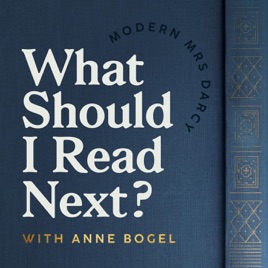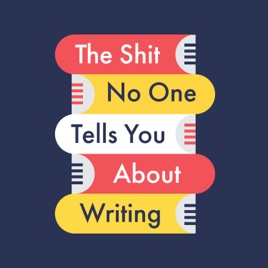
Advertise on podcast: NBN Book of the Day
Rating
4.9 from
Country
This podcast has
1059 episodes
Language
Publisher
Explicit
No
Date created
2020/07/22
Average duration
53 min.
Release period
1 days
Description
The "NBN Book of the Day" features the most timely and interesting author interviews from the New Books Network delivered to you every weekday. Support our show by becoming a premium member! https://newbooksnetwork.supportingcast.fm/book-of-the-day
Podcast episodes
Check latest episodes from NBN Book of the Day podcast
Stanley Wells, "What Was Shakespeare Really Like?" (Cambridge UP, 2023)
2024/02/26
Sir Stanley Wells is one of the world's greatest authorities on William Shakespeare. Here he brings a lifetime of learning and reflection to bear on some of the most tantalising questions about the poet and dramatist that there are. How did he think, feel, and work? What were his relationships like? What did he believe about death? What made him laugh? This freshly thought and immensely engaging study wrestles with fundamental debates concerning Shakespeare's personality and life. The mysteries of how Shakespeare lived, whom and how he loved, how he worked, how he produced some of the greatest and most abidingly popular works in the history of world literature and drama, have fascinated readers for centuries. What Was Shakespeare Really Like? (Cambridge UP, 2023) conjures illuminating insights to reveal Shakespeare as he was. Wells brings the writer and dramatist alive, in all his fascinating humanity, for readers of today.
One of the world's foremost Shakespearians, Professor Sir Stanley Wells CBE, FRSL is a former Life Trustee (1975-2017) and former Chairman of the Shakespeare Birthplace Trust (1991-2011), Emeritus Professor of Shakespeare Studies of the University of Birmingham.
Morteza Hajizadeh is a Ph.D. graduate in English from the University of Auckland in New Zealand. His research interests are Cultural Studies; Critical Theory; Environmental History; Medieval (Intellectual) History; Gothic Studies; 18th and 19th Century British Literature. YouTube channel. Twitter.
Learn more about your ad choices. Visit megaphone.fm/adchoices
Support our show by becoming a premium member! https://newbooksnetwork.supportingcast.fm/book-of-the-day
more
Sarah Keyes, "American Burial Ground: A New History of the Overland Trail" (U Pennsylvania Press, 2023)
2024/02/25
The Overland Trail into the American West is one of the most culturally recognizable symbols of the American past: white covered wagons traversing the plains, filled with heroic pioneers embodying the nation's manifest destiny. In American Burial Ground: A New History of the Overland Trail (University of Pennsylvania Press, 2023), University of Nevada assistant professor of history Sarah Keyes rewrites that well-worn story. Keyes book focuses on a topic that was at the forefront of the minds of those who traveled the train - death. 6,000 (or perhaps more) people died traveling West during the middle decades of the nineteenth century, and in a nation where death rituals held strong symbolic meaning, the realities of dying on the trail were troubling to westward settlers. By looking at the trail through the lens of death, Keyes also includes other forms of, and institutions central to, western migration, namely Indian Removal and the US Army. American Burial Ground is a fresh look at a topic that many people think they know something about - historians will never look at westward migration the same way again.
Learn more about your ad choices. Visit megaphone.fm/adchoices
Support our show by becoming a premium member! https://newbooksnetwork.supportingcast.fm/book-of-the-day
more
Paul Scharre, "Four Battlegrounds: Power in the Age of Artificial Intelligence" (Norton, 2023)
2024/02/24
An award-winning defense expert tells the story of today’s great power rivalry―the struggle to control artificial intelligence.
A new industrial revolution has begun. Like mechanization or electricity before it, artificial intelligence will touch every aspect of our lives―and cause profound disruptions in the balance of global power, especially among the AI superpowers: China, the United States, and Europe. Autonomous weapons expert Paul Scharre takes readers inside the fierce competition to develop and implement this game-changing technology and dominate the future.
Four Battlegrounds: Power in the Age of Artificial Intelligence (Norton, 2023) argues that four key elements define this struggle: data, computing power, talent, and institutions. Data is a vital resource like coal or oil, but it must be collected and refined. Advanced computer chips are the essence of computing power―control over chip supply chains grants leverage over rivals. Talent is about people: which country attracts the best researchers and most advanced technology companies? The fourth “battlefield” is maybe the most critical: the ultimate global leader in AI will have institutions that effectively incorporate AI into their economy, society, and especially their military.
Scharre’s account surges with futuristic technology. He explores the ways AI systems are already discovering new strategies via millions of war-game simulations, developing combat tactics better than any human, tracking billions of people using biometrics, and subtly controlling information with secret algorithms. He visits China’s “National Team” of leading AI companies to show the chilling synergy between China’s government, private sector, and surveillance state. He interviews Pentagon leadership and tours U.S. Defense Department offices in Silicon Valley, revealing deep tensions between the military and tech giants who control data, chips, and talent. Yet he concludes that those tensions, inherent to our democratic system, create resilience and resistance to autocracy in the face of overwhelmingly powerful technology.
Engaging and direct, Four Battlegrounds offers a vivid picture of how AI is transforming warfare, global security, and the future of human freedom―and what it will take for democracies to remain at the forefront of the world order.
Learn more about your ad choices. Visit megaphone.fm/adchoices
Support our show by becoming a premium member! https://newbooksnetwork.supportingcast.fm/book-of-the-day
more
Michael Kimmage, "Collisions: The Origins of the War in Ukraine and the New Global Instability" (Oxford UP, 2024)
2024/02/23
One war, three collisions: Russia with Ukraine, Europe, and the US. On the second anniversary of the full-scale invasion, Michael Kimmage analyses the disparate factors that led to war in Collisions: The Origins of the War in Ukraine and the New Global Instability (OUP Press, 2024).
"After a few anomalous years of peace, Europe became in 2022 what it has always been, an epicentre of conflict, the fault line around which the biggest and worst geopolitical earthquakes tend to occur".
A member of the Secretary's Policy Planning Staff at the US State Department where he handled the Ukraine/Russia portfolio from 2014-2016, Michael Kimmage is now a Professor of History at the Catholic University of America in Washington DC.
*The authors' book recommendations are Paris 1919: Six Months That Changed the World by Margaret MacMillan (Random House, 2002) and The Russo-Ukrainian War by Serhii Plokhy (Allen Lane, 2023).
Tim Gwynn Jones is an economic and political-risk analyst at Medley Advisors, who also writes the twenty4two newsletter on Substack and hosts the In The Room podcast series.
Learn more about your ad choices. Visit megaphone.fm/adchoices
Support our show by becoming a premium member! https://newbooksnetwork.supportingcast.fm/book-of-the-day
more
Katharina Pistor, "The Code of Capital: How the Law Creates Wealth and Inequality" (Princeton UP, 2019)
2024/02/22
"Most lawyers, most actors, most soldiers and sailors, most athletes, most doctors, and most diplomats feel a certain solidarity in the face of outsiders, and, in spite of other differences, they share fragments of a common ethic in their working life, and a kind of moral complicity."
– Stuart Hampshire, Justice is Conflict.
There are many more examples of professional solidarity, however fragmented and tentative, sharing the link of a common ethic that helps make systems, and the analysis of them, possible in the larger political economy. Writing from a law professor’s vantage point, Katharina Pistor, in her new book, The Code of Capital: How the Law Creates Wealth and Inequality (Princeton University Press, 2019) explains how even though law is a social good it has been harnessed as a private commodity over time that creates private wealth, and plays a significant role in the increasing disparity of financial outcomes.
As she points out in this interview, and her chapter ‘Masters of the Code’, it is ‘critical to have lawyers in the room’, and they clearly have the lead role in her well-researched and nuanced thesis centered on the decentralized institution of private law. Professor Pistor builds on Rudden’s ‘feudal calculus’ providing the long view of legal systems in maintaining and creating wealth and draws on historical analogies including the enclosure movements as she interweaves her analysis of capital asset creation with a broader critique of professional and institutional agency. Polanyi and Piketty figure into Pistor’s analysis among many others, as does the help of the state’s coercive backing as she draws on the breadth of her own governance research and analysis of the collapsed socialist regimes in the 1990s, and a research pivot toward western market economies following the 2008 Global Financial Crisis.
Professor Pistor is a comparative scholar with a keen interdisciplinary eye for the relationship between law, values, and markets, dovetailing larger concepts with detailed descriptions of the coding of ‘stocks, bonds, ideas, and even expectations—assets that exist only in law.’ All of which informs her inquiry into why some legal systems have been more accommodating to capital’s coding cravings and others less so, as she describes the process by which capital is created. She moves beyond legal realism’s less granular critiques, and as reviewers such as Samuel Moyn have suggested – this book ‘deserves to be the essential text of any movement today that concerns itself with law and political economy’.
Katharina Pistor is the Edwin B. Parker Professor of Comparative Law, and the Director of the Center on Global Legal Transformation at Columbia Law School.
Keith Krueger lectures at the SHU-UTS Business School in Shanghai.
Learn more about your ad choices. Visit megaphone.fm/adchoices
Support our show by becoming a premium member! https://newbooksnetwork.supportingcast.fm/book-of-the-day
more
Neil Lee, "Innovation for the Masses: How to Share the Benefits of the High-Tech Economy" (U California Press, 2024)
2024/02/21
How can we build a more equal economy? In Innovation for the Masses: How to Share the Benefits of the High-Tech Economy (U California Press, 2024), Neil Lee, a Professor of Economic Geography at the London School of Economics, explores the question of how societies have fostered and supported innovation. The book challenges conventional assumptions that innovative economies must be unequal. Drawing on 4 detailed, and critical, case studies- Switzerland, Austria, Taiwan and Sweden, the book shows how Europe has good models of innovation; how the state matters; and how innovation and shared prosperity policies are mutually reinforcing. Accessible and clearly written, the book will be essential reading across social sciences and public policy, as well as anyone wanting a blueprint for equitable economic development,
Learn more about your ad choices. Visit megaphone.fm/adchoices
Support our show by becoming a premium member! https://newbooksnetwork.supportingcast.fm/book-of-the-day
more
Cameron McWhirter and Zusha Elinson, "American Gun: The True Story of the AR-15" (FSG, 2023)
2024/02/20
In the 1950s, an obsessive firearms designer named Eugene Stoner invented the AR-15 rifle in a California garage. High-minded and patriotic, Stoner sought to devise a lightweight, easy-to-use weapon that could replace the M1s touted by soldiers in World War II. What he did create was a lethal handheld icon of the American century.
In American Gun: The True Story of the AR-15 (FSG, 2023), the veteran Wall Street Journal reporters Cameron McWhirter and Zusha Elinson track the AR-15 from inception to ubiquity. How did the same gun represent the essence of freedom to millions of Americans and the essence of evil to millions more? To answer this question, McWhirter and Elinson follow Stoner--the American Kalashnikov--as he struggled mightily to win support for his invention, which under the name M16 would become standard equipment in Vietnam. Shunned by gun owners at first, the rifle's popularity would take off thanks to a renegade band of small-time gun makers. And in the 2000s, it would become the weapon of choice for mass shooters, prompting widespread calls for proscription even as the gun industry embraced it as a financial savior. Writing with fairness and compassion, McWhirter and Elinson explore America's gun culture, revealing the deep appeal of the AR-15, the awful havoc it wreaks, and the politics of reducing its toll. The result is a moral history of contemporary America's love affair with technology, freedom, and weaponry.
Cameron McWhirter is a national reporter for The Wall Street Journal, based in Atlanta. He has covered mass shootings, violent protests and natural disasters across the South. He is also the author of Red Summer: The Summer of 1919 and the Awakening of Black America. Previously, he reported for other publications in the U.S., as well as Bosnia, Iraq, and Ethiopia.
Zusha Elinson is a national reporter, writing about guns and violence for the Wall Street Journal. Based in California, he has also written for the Center for Investigative Reporting and the New York Times Bay Area section.
Recommended Books:
Robert Caro, The Path to Power
William Shawcross, Sideshow
Dexter Filkins, The Forever War
Adam Winkler, Gun Fight
Tim Mak, Misfire
Doug Stanton, Horse Solidiers
Chris Holmes is Chair of Literatures in English and Associate Professor at Ithaca College. He writes criticism on contemporary global literatures. His book, Kazuo Ishiguro Against World Literature, is under contract with Bloomsbury Publishing. He is the co-director of The New Voices Festival, a celebration of work in poetry, prose, and playwriting by up-and-coming young writers.
Learn more about your ad choices. Visit megaphone.fm/adchoices
Support our show by becoming a premium member! https://newbooksnetwork.supportingcast.fm/book-of-the-day
more
Todd McGowan, "Emancipation After Hegel: Achieving a Contradictory Revolution" (Columbia UP, 2019)
2024/02/19
An Interview with Todd McGowan about his recent Emancipation After Hegel: Achieving a Contradictory Revolution (Columbia University Press, 2019). The book advocates for the relevance of Hegel’s dialectical method to questions of contemporary theory and politics. It seeks to disabuse readers of common misapprehensions concerning Hegel’s philosophy, such as the familiar thesis-antithesis-synthesis schema to which the dialectic has so often been reduced, and to show that the concept of contradiction understood in Hegelian fashion is intrinsically subversive of authority. By championing contradiction over ‘difference’ it defies the rhetoric of much leftist theory as it has been formulated in the wake of so-called ‘post-structuralism’. Emancipation After Hegel also combines sophisticated discussion of matters like the limits of formal logic and the history of German Idealism with playful allusions to Star Trek characters and classic films like Casablanca and Bridge on the River Kwai.
Bill Schaffer is a semi-retired academic and writer. He received his PhD from the University of Sydney and held positions teaching Film Studies, Philosophy, and Literature at campuses in Australia and the UK. He has published widely in Film and Animation Studies. He is currently a scholar of No Fixed Institution.
Learn more about your ad choices. Visit megaphone.fm/adchoices
Support our show by becoming a premium member! https://newbooksnetwork.supportingcast.fm/book-of-the-day
more
Lawrence Glickman, "Free Enterprise: An American History" (Yale UP, 2019)
2024/02/18
“Free enterprise” is an everyday phrase that connotes an American common sense. It appears everywhere from political speeches to pop culture. And it is so central to the idea of the United States that some even labeled Christopher Columbus and the Pilgrims free enterprisers. In his new book, Free Enterprise: An American History (Yale University Press, 2019), Lawrence Glickman analyses that phrase’s historical meaning and shows how it became common sense.
Glickman, a historian and the Stephen and Evalyn Milman Professor in American Studies at Cornell University, traces the phrase from its many 19th-century meanings, of which abolitionists wielded a dominant one (consider the word free), to its conservative reformulation in the 1920s and 30s. He shows how “free enterprise” became the rallying cry of the business community from the 1930s to the Powell Memo in the early 70s. This book is a whirlwind tour of a keyword that has had immense rhetorical power in modern American history and that scholars have yet to critically examine. Glickman’s book provides a compelling example of how historians can study the historical construction of common sense and is a welcome contribution to intellectual history, political history, and the history of capitalism.
Dexter Fergie is a PhD student of US and global history at Northwestern University. He is currently researching the 20th-century geopolitical history of information and communications networks. He can be reached by email at dexter.fergie@u.northwestern.edu or on Twitter @DexterFergie.
Learn more about your ad choices. Visit megaphone.fm/adchoices
Support our show by becoming a premium member! https://newbooksnetwork.supportingcast.fm/book-of-the-day
more
Max Felker-Kantor, "DARE to Say No: Policing and the War on Drugs in Schools" (UNC Press, 2023)
2024/02/17
With its signature "DARE to keep kids off drugs" slogan and iconic t-shirts, DARE (Drug Abuse Resistance Education) was the most popular drug education program of the 1980s and 1990s. But behind the cultural phenomenon is the story of how DARE and other antidrug education programs brought the War on Drugs into schools and ensured that the velvet glove of antidrug education would be backed by the iron fist of rigorous policing and harsh sentencing.
Max Felker-Kantor has assembled the first history of DARE, which began in Los Angeles in 1983 as a joint venture between the police department and the unified school district. By the mid-90s, it was taught in 75 percent of school districts across the United States. DARE received near-universal praise from parents, educators, police officers, and politicians and left an indelible stamp on many millennial memories. But the program had more nefarious ends, and Felker-Kantor complicates simplistic narratives of the War on Drugs.
In DARE to Say No: Policing and the War on Drugs in Schools (UNC Press, 2023), he shows how policing entered US schools and framed drug use as the result of personal responsibility, moral failure, and poor behavior deserving of punishment rather than something deeply rooted in state retrenchment, the abandonment of social service provisions, and structures of social and economic inequality.
Jeffrey Lamson is a PhD student in world history at Northeastern University. His research focuses on the history of police technology, its relationship to the history of police reform, and its place at the intersection of U.S. domestic policing and global counterinsurgency.
Learn more about your ad choices. Visit megaphone.fm/adchoices
Support our show by becoming a premium member! https://newbooksnetwork.supportingcast.fm/book-of-the-day
more
Sarah Parry Myers, "Earning Their Wings: The WASPs of World War II and the Fight for Veteran Recognition" (UNC Press, 2023)
2024/02/16
Established by the Army Air Force in 1943, the Women's Airforce Service Pilots (WASP) program opened to civilian women with a pilot's licence who could afford to pay for their own transportation, training, and uniforms. Despite their highly developed skill set, rigorous training, and often dangerous work, the women of WASP were not granted military status until 1977, denied over three decades of Army Air Force benefits as well as the honour and respect given to male and female World War II veterans of other branches. In Earning Their Wings: The WASPS of World War II and the Fight for Veteran Recognition (UNC Press, 2023), Dr. Sarah Parry Myers not only offers a history of this short-lived program but considers its long-term consequences for the women who participated and subsequent generations of servicewomen and activists.
Dr. Myers shows us how those in the WASP program bonded through their training, living together in barracks, sharing the dangers of risky flights, and struggling to be recognized as military personnel, and the friendships they forged lasted well after the Army Air Force dissolved the program. Despite the WASP program's short duration, its fliers formed activist networks and spent the next thirty years lobbying for recognition as veterans. Their efforts were finally recognized when President Jimmy Carter signed a bill into law granting WASP participants retroactive veteran status, entitling them to military benefits and burials.
This interview was conducted by Dr. Miranda Melcher whose forthcoming book focuses on post-conflict military integration, understanding treaty negotiation and implementation in civil war contexts, with qualitative analysis of the Angolan and Mozambican civil wars.
Learn more about your ad choices. Visit megaphone.fm/adchoices
Support our show by becoming a premium member! https://newbooksnetwork.supportingcast.fm/book-of-the-day
more
Richard L. Hasen, "A Real Right to Vote: How a Constitutional Amendment Can Safeguard American Democracy" (Princeton UP, 2024)
2024/02/15
Throughout history, too many Americans have been disenfranchised or faced needless barriers to voting. Part of the blame falls on the Constitution, which does not contain an affirmative right to vote. The Supreme Court has made matters worse by failing to protect voting rights and limiting Congress's ability to do so. The time has come for voters to take action and push for an amendment to the Constitution that would guarantee this right for all.
Drawing on troubling stories of state attempts to disenfranchise military voters, women, African Americans, students, former felons, Native Americans, and others, Richard Hasen argues that American democracy can and should do better in assuring that all eligible voters can cast a meaningful vote that will be fairly counted. He shows how a constitutional right to vote can deescalate voting wars between political parties that lead to endless rounds of litigation and undermine voter confidence in elections, and can safeguard democracy against dangerous attempts at election subversion like the one we witnessed in the aftermath of the 2020 presidential election.
The path to a constitutional amendment is undoubtedly hard, especially in these polarized times. A Real Right to Vote: How a Constitutional Amendment Can Safeguard American Democracy (Princeton UP, 2024) explains what's in it for conservatives who have resisted voting reform and reveals how the pursuit of an amendment can yield tangible dividends for democracy long before ratification.
Learn more about your ad choices. Visit megaphone.fm/adchoices
Support our show by becoming a premium member! https://newbooksnetwork.supportingcast.fm/book-of-the-day
more
Podcast sponsorship advertising
Start advertising on NBN Book of the Day & sponsor relevant audience podcasts
You may also like these books Podcasts

4.9
3253
177
Poetry Unbound
On Being Studios

4.4
2530
21
Selected Shorts
Symphony Space

4.4
2994
204
The New Yorker: Fiction
WNYC Studios and The New Yorker

4.8
4862
419
What Should I Read Next?
Anne Bogel

4.8
574
238
The Shit No One Tells You About Writing
Bianca Marais, Carly Watters and CeCe Lyra

4.6
1456
311
Currently Reading
Meredith Monday Schwartz and Kaytee Cobb

4.6
1744
160
Glamorous Trash: A Celebrity Memoir Podcast
Chelsea Devantez

4.9
1790
320
The Prancing Pony Podcast
The Prancing Pony Podcast

4.7
756
41
The Paris Review
The Paris Review

4.8
3967
308
Bad On Paper
Becca Freeman & Olivia Muenter



